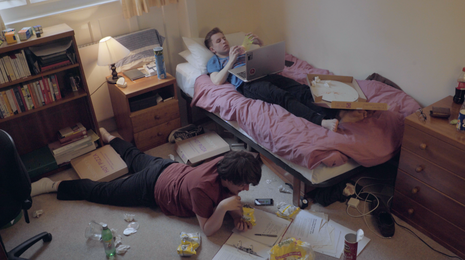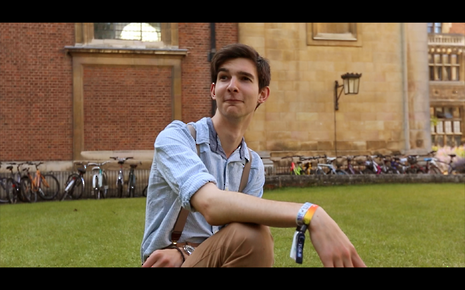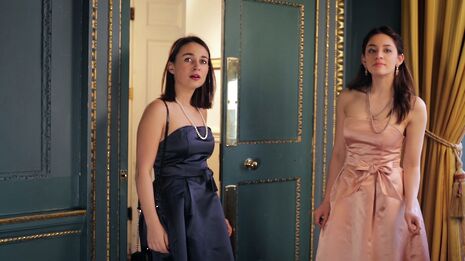In conversation with Cambridge Shorts
Nat Rosa speaks to the student directors behind Cambridge’s only student film festival

On Tuesday 18th October, the ADC Theatre will host Cambridge Shorts, a showcase of six exceptional short films created by students from across the University. Filmmaking duo Joanna Taylor and Luke Naylor-Perrott, as well as directors Fay Cartwright and Patrick Brooks, are among the talented filmmakers whose work has been chosen to debut at the festival night.
Joanna Taylor and Luke Naylor-Perrott bonded over their shared love of filmmaking. Joanna, an English student with a penchant for journalism and writing, and Luke, a historian skilled with the technical aspects of production and editing, found that their complementary skill sets were matched by their equally compatible personalities. The concept for their short, It’s Okay If It’s Catchy, came to Joanna one afternoon during a zumba class. Listening to the lyrics of the songs she was dancing to, she realised how inappropriate so much of what is said in modern music can be, if set in a quotidian context. The film thus does exactly that, decontextualising refrains from various popular songs for both comedic value and as a barbed critique of the normalisation of misogyny.
It’s Okay If It’s Catchy was filmed over the course of just a few days and is the product of guerrilla filmmaking at its very best. From talented peers willing to serve as actors to picturesque panoramas providing scenic backdrops, both Joanna and Luke had a wealth of resources at their disposal to make their short. The originality, talent, and creativity, that went into making their film pours out of the screen, and its enthusiasm is infectious. “It’s amazing to be in a place where a few ideas and a few people can make a film in a few days,” says Luke of his experience as a young filmmaker in Cambridge. Joanna agrees and also believes that “the intensity of life here is unique and drives a real sense that anything can happen.”

Former Tab Editor and English third-year Patrick Brooks also cites the vibrancy of Cambridge as a driving force behind his pursuit of filmmaking. On Tuesday, he will debut his film 7 Steps to Becoming a Student Druglord, a dark comedy that tells the story of a burgeoning friendship mimicking the style of a Buzzfeed how-to guide. Influenced by Hank Corwin’s energetic editing style in The Big Short, Patrick’s film is assembled in a tableau of agile, fast cuts that build into a witty and compelling narrative. As a medium, shorts are uniquely primed to benefit from this stylistic approach given the succinct nature of their conventions. 7 Steps to Becoming a Student Druglord is no exception, telling its story with a captivating effervescence and spirited verve.
As a director and Co-President of the Cambridge Film Association, Patrick is deeply invested in fomenting an environment where students feel encouraged to pursue their creative ambitions in the seventh art. Though still a nascent activity in Cambridge if compared with the strength of art and theatre, events such as Cambridge Shorts and the growing number of students engaged in film societies and filmmaking activities is evidence that the genre has a bright future. “We’re trying to change things gradually. With this new film night we now have six films coming out every term and hopefully events like this one will become a fixture and will help encourage students to look to filmmaking.”
Art historian Fay Cartwright also believes that filmmaking is on the rise at Cambridge, and was invigorated by the collaborative environment she was able to forge among friends and peers. For Fay, filmmaking was a pursuit she had always wanted to engage in but was unsure of how to approach the medium. Directing a short gave her the tools and opportunity to explore her talents and find kindred creatives in her student community. “Shorts are a great way to find your own beat as a filmmaker and a great way to gain exposure as well.”

Her short, Are You Popular? follows the exploits of two hapless young women at a prestigious London finishing school who must create a social media campaign as part of their final task. At once funny, sharp, clever and complex, the film was first inspired by American instructional videos from the 1940s that delineated proper comportment and normative social interactions. The concept then broadened to become a critique of society’s focus on social constructs and, specifically, social media and the notion of popularity. “Social media has become a huge outlet,” says Fay. “There is a huge conversation about how people are living their lives for social media. They are sitting alone in a room but have 1,000 likes on a photograph, and there is a very real disconnect between this type of constructed popularity and reality.”
The work of these four young filmmakers stands out for its quality, charm and passion. Cambridge Shorts is a celebration not only of their work, but a powerful medium to impel a new generation of filmmakers to uncover the power of shorts to hone their craft, and in the process become better storytellers, cinematographers, writers and directors
 News / Cambridge academics stand out in King’s 2026 Honours List2 January 2026
News / Cambridge academics stand out in King’s 2026 Honours List2 January 2026 Interviews / You don’t need to peak at Cambridge, says Robin Harding31 December 2025
Interviews / You don’t need to peak at Cambridge, says Robin Harding31 December 2025 Comment / What happened to men at Cambridge?31 December 2025
Comment / What happened to men at Cambridge?31 December 2025 News / Varsity’s biggest stories of 202531 December 2025
News / Varsity’s biggest stories of 202531 December 2025 News / Unions protest handling of redundancies at Epidemiology Unit30 December 2025
News / Unions protest handling of redundancies at Epidemiology Unit30 December 2025









